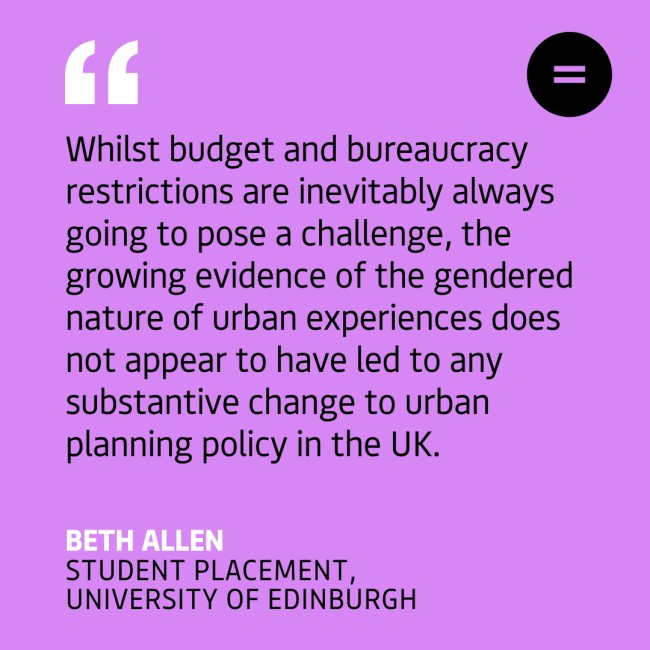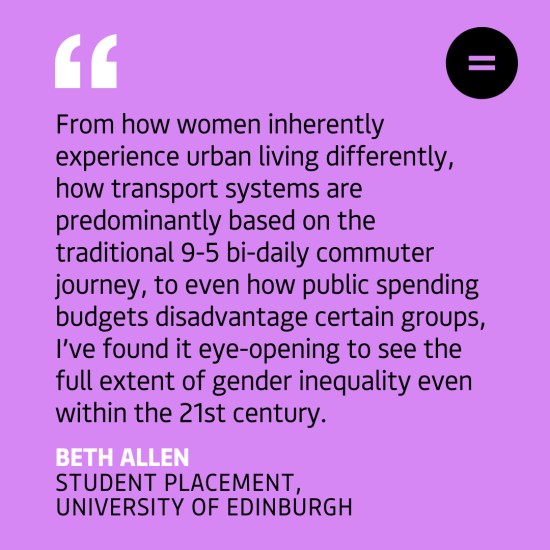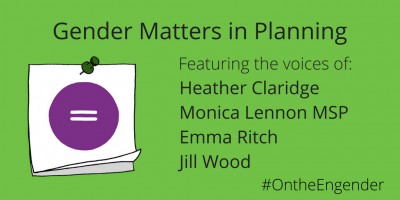Engender blog
Joining Up Policymaking to Prevent Violence Against Women and Girls

At Engender, one of our areas of focus is preventing violence against women and girls (VAWG) before it gets the chance to occur. This approach, known as primary prevention, focuses on tackling the root cause of violence, gender inequality, by embedding gender-sensitive thinking into every area of public policy.
Through our Delivering Equally Safe project, we explore how different areas of public policy can prevent violence from occurring. We believe that to truly move the needle on VAWG, we need more than good intentions. We need policy professionals across sectors to work together. That’s why, in 2024, we brought over 50 policy professionals from 30 different organisations together for our first Primary Prevention and Policymaking Conference.
Our first conference showed just how vital cross-sector collaboration amongst policy professionals is to embedding primary prevention. Fast forward one year, and we were delighted to be joined by policy professionals from across Scotland in Glasgow in March to reflect, share the findings of our recent research, and look ahead. It was a chance to share knowledge, build relationships, and spark real momentum.
 Where We Are a Year On...
Where We Are a Year On...
At this year’s event, Hannah Brisbane, our Delivering Eqaully Safe Policy Officer, kicked things off with a deep dive into the Delivering Equally Safe (DES) project. Her presentation unpacked what some of the key components of a primary prevention approach in policymaking, including:
- Equal representation across all levels
- Intersectional gender analysis
- Designing policies that actively promote women’s safety
Hannah also shared reflections from the previous year’s conference, noting that attendees had expressed a sense of pride in Scotland’s world-leading approach to addressing VAWG but were frustrated that budgets and capacity did not match the scale of the challenge we face.
Good Practice and Missed Opportunities
Following last year’s conference, we commissioned research to find out more about local primary prevention approaches in Scotland, and we’re delighted to share the report produced by independent research consultant Kathryn Ramsay with you now.
The report highlights several structural barriers to primary prevention work across local areas, including:
- a lack of authority for VAWPs,
- a lack of funding and resources for existing work and
- insufficient priority given to prevention work by leaders. Kathryn also shared other challenges beyond these, including
- the poor implementation of the Public Sector Equality Duty (PSED), the
- lack of reliable measures of progress with prevention and
- the use of potentially confusing terms and jargon
In Kathryn’s research, numerous interviewees highlighted existing Equally Safe programmes (Equally Safe at School, Equally Safe at Work, and Equally Safe in Practice) as good practice happening locally on primary prevention. These initiatives are real-world examples of how prevention can be embedded into different areas, and it’s interesting to note that these good practice examples were designed and delivered by women’s sector organisations.
Reflections
We asked attendees at this year’s conference to reflect on what enables them to take a primary prevention approach, and what gets in the way. Not surprisingly, funding and capacity came up as one of the most common barriers to implementing primary prevention. However, many attendees also noted the potential for funding and capacity to be vital enablers when provided adequately and sustainably.
Other key enablers included:
- Gender expertise and competence
- Intersectional thinking
- Networks like the the National Violence Against Women Network, the Authentic Voices Network and the Safer, Sooner Domestic Abuse network
It’s clear to us that there is a strong appetite for cross-sector collaboration, and that people want to work together to build policies that prevent violence before it starts. While opportunities exist to facilitate this collaboration, Kathryn’s research shows that some of these are not reaching their full potential.
 What’s Next?
What’s Next?
We’ll be using the findings from Kathryn’s report and from the sessions throughout this year’s conference to push for meaningful change in relation to the implementation of primary prevention in Scotland. We’ve created a conference report that explores what was shared in workshop sessions on gender mainstreaming, VAW in politics and public life, a public health approach to preventing VAWG, and applying a primary prevention lens to public policy.
Read the conference report here.
Read Kathryn’s research report here.
GUEST POST: Feminist urbanism: Creating gender-equal cities in Scotland
Engender and the Equal Media and Culture Centre for Scotland have hosted student placements from the MSc in Social Research at the University of Edinburgh and the University of Strathclyde Applied Gender Studies and Research Methods course. As part of their research outputs, the students have produced a series of blogs.
In this post, Beth looks at how women and men experience public space and urban environments and how we can create gender-equal cities in Scotland.

When considering issues of gender inequality, one aspect that is perhaps far subtler and more discrete than others is the way in which the built environment is experienced differently by men and women.
In recent decades, feminist research has studied this phenomenon, with the evidence undeniably pointing to women being disadvantaged in their use of urban spaces. From a lack of accessible and functional public toilets, which biologically women require greater use of, to transport systems that are not built for a purpose beyond that of a daily office commuter, a range of factors have been demonstrated to restrict women’s access to the cities.
GUEST POST: Reflections of the Student Placement Experience - An Insight into the Women’s Sector in Scotland
Today we're publishing the next in a series of blogs from recent student placements Engender has hosted from the MSc in Social Research at the University of Edinburgh and the University of Strathclyde Applied Gender Studies and Research Methods course.
In this post, Beth reflects on her experience of undertaking a research placement and the importance of considering urban planning policies through a feminist lens.

During the summer semester of my MSc in Social Research at the University of Edinburgh, I have been fortunate enough to experience completing my dissertation as a placement student with Engender. This placement has been invaluable, and I wanted to take this opportunity to reflect on this and maybe inspire others to gain experience of working within the women’s sector.
On the Engender: Gender Matters in Planning

As we continue to look at gender and public space on On the Engender, our podcast host Alys Mumford is joined by an panel of feminist voices to consider why gender matters in planning.
Here she writes on why it's so important that women are included at all levels of planning decisions:
We all have an opinion on planning. Whether we get frustrated at how far the nursery is from the residential home, feel smug at knowing a hidden cut-through which doesn’t appear on the maps, or have regular arguments with the local Starbucks about why we have to use their bathrooms because the local council shut down all the public toilets. And once you notice how bad some planning decisions are for women, you start seeing them everywhere.
Downloads
 Engender Briefing: Pension Credit Entitlement Changes
From 15 May 2019, new changes will be introduced which will require couples where one partner has reached state pension age and one has not (‘mixed age couples’) to claim universal credit (UC) instead of Pension Credit.
Engender Briefing: Pension Credit Entitlement Changes
From 15 May 2019, new changes will be introduced which will require couples where one partner has reached state pension age and one has not (‘mixed age couples’) to claim universal credit (UC) instead of Pension Credit.
 Engender Parliamentary Briefing: Condemnation of Misogyny, Racism, Harassment and Sexism
Engender welcomes this Scottish Parliament Debate on Condemnation of Misogyny, Racism, Harassment and Sexism and the opportunity to raise awareness of the ways in which women in Scotland’s inequality contributes to gender-based violence.
Engender Parliamentary Briefing: Condemnation of Misogyny, Racism, Harassment and Sexism
Engender welcomes this Scottish Parliament Debate on Condemnation of Misogyny, Racism, Harassment and Sexism and the opportunity to raise awareness of the ways in which women in Scotland’s inequality contributes to gender-based violence.
 Gender Matters in Social Security: Individual Payments of Universal Credit
A paper calling on the Scottish Government to automatically split payments of Universal Credit between couples, once this power is devolved to the Scottish Parliament.
Gender Matters in Social Security: Individual Payments of Universal Credit
A paper calling on the Scottish Government to automatically split payments of Universal Credit between couples, once this power is devolved to the Scottish Parliament.
 Gender Matters Manifesto: Twenty for 2016
This manifesto sets out measures that, with political will, can be taken over the next parliamentary term in pursuit of these goals.
Gender Matters Manifesto: Twenty for 2016
This manifesto sets out measures that, with political will, can be taken over the next parliamentary term in pursuit of these goals.
 Scottish NGO Briefing for UN Special Rapporteur on Violence Against Women
Joint briefing paper for the UN Rapporteur on Violence Against Women.
Scottish NGO Briefing for UN Special Rapporteur on Violence Against Women
Joint briefing paper for the UN Rapporteur on Violence Against Women.

Newsletter
Sign up to receive our newsletter here:
Sign up to our mailing list
Receive key feminist updates direct to your inbox:
